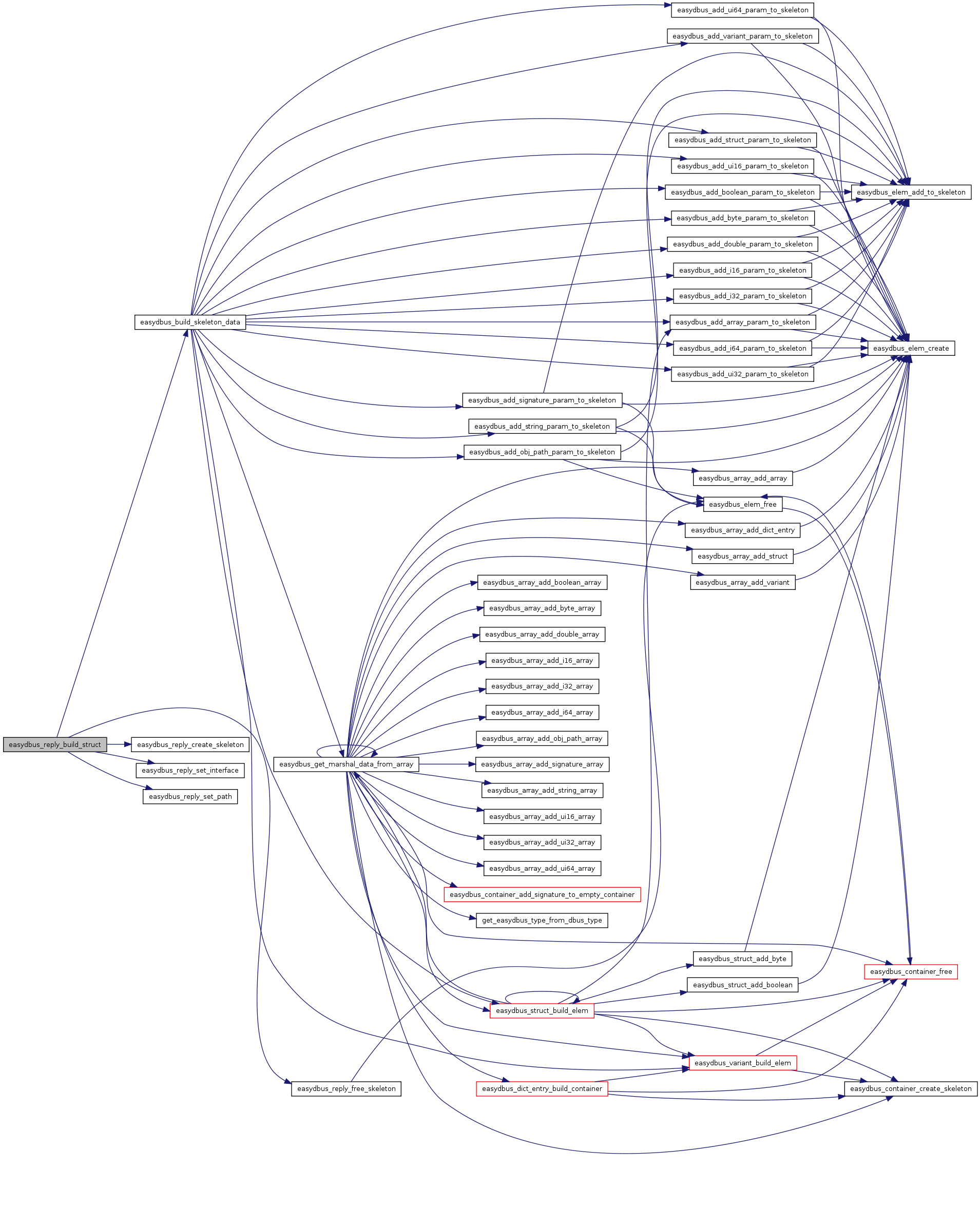
|

|
TO COMPLETE
Functions | |
| int | easydbus_reply_build_error (struct EasyDbus_method *method, const char *error_msg) |
| Create Error reply. | |
| int | easydbus_reply_build_struct (struct EasyDbus_method *method, DBusMessage *reply) |
| Create EasyDbus_reply for an EasyDbus_method object from a DBusMessage reply. | |
| DBusMessage * | easydbus_reply_create_msg (struct EasyDbus_core *core, struct EasyDbus_reply *reply, DBusMessage *method_msg) |
| Create DBusMessage for reply. | |
| int | easydbus_reply_send (struct EasyDbus_core *core, DBusMessage *method_msg, struct EasyDbus_reply *reply) |
| Send reply on DBus bus. | |
| int | easydbus_reply_send_error (struct EasyDbus_core *core, DBusMessage *msg, char *error_name, char *error_string) |
| Send error reply. | |
| int easydbus_reply_build_error | ( | struct EasyDbus_method * | method, | |
| const char * | error_msg | |||
| ) |
Create Error reply.
| method | EasyDbus_method object pointer where is created error reply for user. | |
| error_msg | string with error message. |
0 ok
For internal use only.
Definition at line 286 of file reply.c.
References easydbus_add_string_param_to_skeleton(), EASYDBUS_ET_FAILURE, EASYDBUS_ET_REPLY, easydbus_reply_create_skeleton(), easydbus_reply_free_skeleton(), EasyDbus_method::reply, and EasyDbus_reply::type.
Referenced by easydbus_send_method_withReply_Blocking().
00288 { 00289 struct EasyDbus_reply *reply_foruser = NULL; 00290 00291 reply_foruser = easydbus_reply_create_skeleton (); 00292 if (!reply_foruser) 00293 return -1; 00294 00295 if (easydbus_add_string_param_to_skeleton 00296 (EASYDBUS_ET_REPLY, reply_foruser, (char *) error_msg)) 00297 goto out_of_memory; 00298 00299 reply_foruser->type = EASYDBUS_ET_FAILURE; 00300 method->reply = reply_foruser; 00301 00302 return 0; 00303 out_of_memory: 00304 if (reply_foruser) 00305 easydbus_reply_free_skeleton (reply_foruser); 00306 return -1; 00307 }

| int easydbus_reply_build_struct | ( | struct EasyDbus_method * | method, | |
| DBusMessage * | reply | |||
| ) |
Create EasyDbus_reply for an EasyDbus_method object from a DBusMessage reply.
| method | EasyDbus_method object pointer | |
| reply | DBusMessage with reply data |
-1 error
For internal use only.
Definition at line 319 of file reply.c.
References easydbus_build_skeleton_data(), EASYDBUS_ET_INVALID, EASYDBUS_ET_REPLY, easydbus_reply_create_skeleton(), easydbus_reply_free_skeleton(), easydbus_reply_set_interface(), easydbus_reply_set_path(), EasyDbusDebug, EasyDbus_method::reply, and EasyDbus_reply::type.
Referenced by easydbus_send_method_withReply_Blocking().
00321 { 00322 struct EasyDbus_reply *reply_foruser = NULL; 00323 const char *temp = NULL; 00324 int type_msg = 0; 00325 00326 reply_foruser = easydbus_reply_create_skeleton (); 00327 00328 if (!reply_foruser) 00329 return -1; 00330 00331 temp = dbus_message_get_path (reply); 00332 /* see of manage case where path == NULL */ 00333 //if (temp == NULL) goto out_of_memory_error; 00334 00335 if (temp) 00336 if (easydbus_reply_set_path (reply_foruser, temp)) 00337 goto out_of_memory_error; 00338 00339 temp = dbus_message_get_interface (reply); 00340 /* see of manage case where path == NULL */ 00341 //if (temp == NULL) goto out_of_memory_error; 00342 00343 if (temp) 00344 if (easydbus_reply_set_interface (reply_foruser, 00345 temp)) 00346 goto out_of_memory_error; 00347 00348 type_msg = dbus_message_get_type (reply); 00349 if (type_msg == DBUS_MESSAGE_TYPE_METHOD_RETURN) 00350 reply_foruser->type = EASYDBUS_ET_REPLY; 00351 else 00352 reply_foruser->type = EASYDBUS_ET_INVALID; 00353 00354 easydbus_build_skeleton_data (reply, EASYDBUS_ET_REPLY, 00355 reply_foruser); 00356 00357 method->reply = reply_foruser; 00358 EasyDbusDebug ("Created reply object"); 00359 return 0; 00360 00361 out_of_memory_error: 00362 00363 if (reply_foruser) 00364 easydbus_reply_free_skeleton (reply_foruser); 00365 00366 return -1; 00367 }

| DBusMessage* easydbus_reply_create_msg | ( | struct EasyDbus_core * | core, | |
| struct EasyDbus_reply * | reply, | |||
| DBusMessage * | method_msg | |||
| ) | [inline] |
Create DBusMessage for reply.
For internal use only.
| core | EasyDbus_core object pointer | |
| method_msg | DBusMessage of message that must be replied | |
| reply | EasyDbus_reply object pointer. |
DBusMessage object pointer for reply.
Definition at line 188 of file reply.c.
References add_elems_to_msg(), EasyDbus_reply::args, EASYDBUS_ELTYPE_STRING, EASYDBUS_ET_FAILURE, EASYDBUS_ET_REPLY, EasyDbus_reply::first, EasyDbus_elem::string, EasyDbus_elem::type, and EasyDbus_reply::type.
Referenced by easydbus_reply_send().
00191 { 00192 DBusMessage *msg = NULL; 00193 00194 if (reply->type == EASYDBUS_ET_REPLY) { 00195 /* create msg */ 00196 msg = dbus_message_new_method_return (method_msg); 00197 } 00198 else if (reply->type == EASYDBUS_ET_FAILURE) { 00199 if (reply->args == 1 && 00200 reply->first->type == EASYDBUS_ELTYPE_STRING) { 00201 msg = dbus_message_new_error (method_msg, 00202 DBUS_ERROR_FAILED, 00203 (const char *) reply->first-> 00204 payload.string); 00205 } 00206 } 00207 00208 if (msg && 00209 /* add method data if there are */ 00210 (reply->args && reply->type == EASYDBUS_ET_REPLY)) 00211 add_elems_to_msg (msg, reply->first); 00212 00213 return msg; 00214 }

| int easydbus_reply_send | ( | struct EasyDbus_core * | core, | |
| DBusMessage * | method_msg, | |||
| struct EasyDbus_reply * | reply | |||
| ) |
Send reply on DBus bus.
For internal use only.
| core | EasyDbus_core object pointer | |
| method_msg | DBusMessage of message that must be replied | |
| reply | EasyDbus_reply object pointer. |
0 ok
Definition at line 151 of file reply.c.
References easydbus_message_send(), easydbus_reply_create_msg(), and EasyDbusDebug.
Referenced by easydbus_introspect_filter_func(), and easydbus_obj_path_msg_function().
00154 { 00155 DBusMessage *msg = NULL; 00156 int ret = -1; 00157 00158 if (!reply || !method_msg || !core) { 00159 EasyDbusDebug ("Error from input params"); 00160 return -1; 00161 } 00162 00163 msg = easydbus_reply_create_msg (core, reply, method_msg); 00164 00165 if (msg && 00166 !easydbus_message_send (core, msg, 1, NULL)) 00167 ret = 0; 00168 00169 if (msg) 00170 dbus_message_unref (msg); 00171 00172 return ret; 00173 }

| int easydbus_reply_send_error | ( | struct EasyDbus_core * | core, | |
| DBusMessage * | msg, | |||
| char * | error_name, | |||
| char * | error_string | |||
| ) |
Send error reply.
For internal use only.
| core | pointer to EasyDbus_core object | |
| msg | DBusMessage that needed error reply. | |
| error_name | Error name | |
| error_string | Error string |
0 ok
Definition at line 64 of file reply.c.
References easydbus_message_send(), and EasyDbusDebug.
Referenced by easydbus_introspect_filter_func(), and easydbus_obj_path_msg_function().
00067 { 00068 DBusMessage *error = NULL; 00069 00070 if (!core || !msg || !error_name || !error_string) { 00071 EasyDbusDebug ("Error from input params"); 00072 return -1; 00073 } 00074 00075 error = dbus_message_new_error (msg, 00076 DBUS_ERROR_FAILED, 00077 (const char *) error_string); 00078 00079 if (!error) 00080 return -1; 00081 00082 if (easydbus_message_send (core, error, 1, NULL)) { 00083 dbus_message_unref (error); 00084 return -1; 00085 } 00086 dbus_message_unref (error); 00087 return 0; 00088 }

 1.5.4
1.5.4